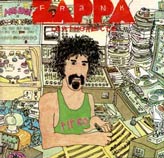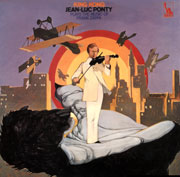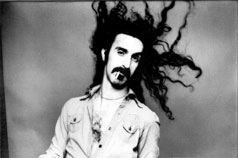|
|
|
Frank Zappa / LEATHERETTE
1978 |
|
|
 |
|
「好きだから買ったんですけど」のbootleg、でも"Dead Girls Of London"Original version with Van Morrisonが入ってる。
YCDTOSA第5弾にも82年超ハイテクバンド版が収録されたが、時期的には来日した頃?、明らかにライン録りのクリアな音質。ベルファスト・カウボーイはザッパの方がはまってる。 |
|
|
となりのザッパ 身近な「ZAPPA」を捜そう
レコード・コレクターズ増刊号アメリカン・ロックVOL.3のザッパの扱いに抗議する!
|
|
|
 |
|
Funkadelic / THE ELECTRIC SPANKING OF WAR BABIES
1981
George Clinton、御大MacのCFに出てますなぁ、相変わらずの存在感は流石、率いるファンカデリック、当時からZAPPAとの共通点はいわれていたけど、このアルバムの裏ジャケに「ZAPPA」の文言が。一部の好事家の間に話題を提供したことは記憶に新しい。さてCDではどうなってるのか。
|
|
|
 |
|
|
|
 |
JEAN-LUC PONTY / KING KONG
1970
|
|
|
If Zappa were writing the notes, he would surely warn you immediately of the total lack of commercial potential.
He is not alone in his awareness of the value of reverse psychology. I am so concerned about the success of this album that I wouldn't dream of recommending it.
Necessity was the mother of Jean-Luc Ponty. Nothing truly new had happened in jazz violin-well, nothing that made any impact-since Ray Nance joined Duke, almost 30 years ago.
Dick Bock was the mother of collaboration. "I'd heard more and more about Frank Zappa in jazz circles. Then Frank played me some of the Hot Rats album, which he was still working on.
It was hard to pigeonhole; just fascinating instrumental music.
Then I took an acetate of Jean-Luc to Frank's house, A few days later Jean-Luc played on a Hot Rats track." (Not available at this counter; try Bizarre Records.)
As Ponty and Zappa promptly developed an interest in each other's music, the concept of a collaborative project was born.
Frank was particularly concerned with the development of an extended orchestral work, a formal piece tied to no one idiom and allowing Ponty interludes of expressive freedom. Music For Electric Violin And Low Budget Orchestra (a title decided upon, one suspects, after Zappa had asked Bock for a 97-piece ensemble) is illustrative of Zappa's mastery not only of composition and orchestration, but also of transition. It emerges not as a segmented series of ideas arbitrarily linked together, but as a securely integrated whole that moves with almost subliminal subtlety from one tempo, meter, mood or idiom to another, and from reading to blowing; from the opening bassoon figure to the demonic closing violin passages in 7/8, itsustains this validity throughout its multi-textured duration.
The long work was conducted by Ian Underwood, former alto saxophonist and keyboarder with the Mothers of Invention, possessor of a bachelor's from Yale and a master's from Berkeley in piano and composition.
"Don Christlieb is one of the best bassoonists around, especially for the avant garde," says F.Z. "He has played Stockhausen and does regular concerts of contemporary music." He is also the father of Pete Christlieb, one of Hollywood's brightest new jazz tenor saxes.
Arthur D.Tripp, III, formerly the Mothers' percussionist, spent two years with the Cincinnati Symphony. (Zappa: "He really gets into those meters.") Buell Neidlinger, a premature jazz avantist, played with Cecil Taylor and Gil Evans in the l950s.
"He's with the Boston Symphony now," says Frank, but I had to fly him out here-he's the only man I can think of who could play the bass part on the long piece."
Of the compositions on side one, it need only be said that they place Ponty in settings generally closer to jazz (if that term is still capable of definition), the first three being basically in three and composed by Zappa. The Ponty number (composed by Jean-Luc, in four, arranged by Zappa) is the easiest blowing track, a G 7 vamp that provides a base for some of his most resourceful and unpredictable shifting of phrases, dissonant concepts and hard-swinging, post-Stuff Smith execution.
For me, the blowing on How Would You Like To Have A Head Like That constitute Ponty's best work in the album. For Zappa, Jean-Luc's peak is reached on Idiot Bastard Son. For both of us, George Duke is a phenomenon throughout all tracks. "I'm only surprised: I Frank comments, "that he didn't happen sooner." He certainly has happened now, with a little help from friends Bock and Ponty, on earlier collaborations, on records and in person.
Analyzing the overall performances, one could point out a number of details, like the ingenuity of the slowed-down purse at the climactic point in King Kong, the tight teamwork between
Ponty and Ernie Watts on Cigars, Ernie's solo and Zappa's wah-wah assertions on Head. One would be wasting one's time, since they are all clearly enough recorded to be heard without lectures or blackboard illustrations.
A final word must be added, though, for the brief closing track on side 2. America Drinks And Goes Home has a put-on flavor, a quixotic rhythmic and melodic quality, almost a touch of the Zeitgeist of Cabaret. John Guerin was aIIowed total freedom; George Duke gets into the feet of the piece, which, as Frank says, "suggests a bunch of drunks leaning up against a bar." The galloping finale brings the work to a disarmingly abrupt end. Like Idiot Bastard Son and King Kong, this was previously recorded by the Mothers.
Just as it mirrors the growing unification of all musics, the Ponty-Zappa fusion shows that if you team a freaky French fiddler from over there with a master of the bizarre and the guitar from over here, what might seem to invite double jeopardy produces double genius.
-----
Leonard Feather
|
|
|
 |
|
|
|
 |
It may be an illegal act to carry this photograph here.
However, a photograph of this Zappa is a thing with terrible attachment for me.
I have provision stopping a publication of this photograph by warning of a claim person.
|
|
|
Hot Shots
photographs by Norman Seef
1974
|
|
|
|
 |
|
The musicians:
FRANK ZAPPA - lead guitar & vocal
RAY WHITE - rhythm guitar & vocal
IKE WILLIS - rhythm guitar & vocal
BOBBY MARTIN - keyboards, sax & vocal
ALAN ZAVOD - keyboards (solo on "CLEVELAND")
SCOTT THUNES - bass
CHAD WACKERMAN - drums (solo on "CLEVELAND")
DWEEIIL ZAPPA - guitar solo on 'WHIPPIN' POST"
These songs were selected from the repertoire of the 1984 World Tour. Over a six month period, many hours of exciting live material was recorded in a 24 track digital format. It took another six months to remix it onto PCM 1610 digital 2 track masters. If you enjoy this recording, be advised that there is a lot more lurking in the vault. These tunes were selected because they follow the basic outline of the "DOES HUMOR BELONG IN MUSIC?" PMI/ICA video tape, as well as presenting some new, unreleased material. The recording dates were:
The Odeon Hammersmilh, London, Enghnd,8/10/84
The Civic Center, Providence, Rhode lsland,26/10/84
Amherst College, Lowell, Massachusetts,28/10/84
The Tower Theater, Philadelphia, Pennsylvania, 10/11/84
The Bismark Theater, Chicago, Illinois, 23/11/84
The Boy Front Arena, St.Petersburg, Florida,1/12/84
The Paramount Theater, Seattle, Washington,17/12/84
Queen Elizabeth Theatre, Vancouver, British Columbia,18/12/84
The Universal Amphitheater, Los Angeles, California,23/12I84
song information:
ZOOT ALLURES - head is from London, solo from Providence
TINSEL-TOWN REBELUON - body of tune is from Chicago Illinois, ending is from Seattle
TROUBLE EVERY DAY - verses from St.Petersburg, solo from London
PENGUIN IN BONDAGE - vocal sections from Vancouver and St.Petersburg, solo from Vancouver
GREEN HOTEL - Vancouver
BALTIMORE - front of tune is from Los Angeles, vocals from Philadelphia, solo is from Los Angeles
COCK-SUCKERS' BALL - Los Angeles
WPU - Los Angeles
CLEVELAND - intro from Los Angeles, piano solo from St.Petersburg, drum solo from Vancouver, guitar Solo from Amherst College, out chorus from Los Angeles
WHIPPIN' POST - Los Angeles (The last song of the last show of the last tour)
for ZAPPA INFORMATION & MAIL ORDER ITEMS phone 818-PUMPKIN
"DOES HUMOR BELONG IN MUSIC?" is now available on video cassette from PMI/ICA. Many of the same song titles are included in the cassette, but the versions are TOTALLY DIFFERENT (they were taped at The Pier in NYC).
The video contains ZOOT ALLURES, TINSEL-TOWN REBELUON, TROUBLE EVERY DAY, GREEN HOTEL, THE DANGEROUS KITCHEN, HE'S SO GAY, BOBBY BROWN,
KEEP IT GREASY, HONEY DON'T YOU WANT A MAN LIKE ME?, DINAH-MOE HUNM, COSMIC DEBRIS, BE IN NY VIDEO, DANCIN' FOOL, and WHIPPIN' POST
(Dweezil is not on that version). It also contains some very funny interview material, so don't miss it.
|
|
|
Dose Humor Belong In Music?
1984
|
|
| In these contents, the reason that used English wanted to try to test the OCR application function that I obtained recently. |
|
|
|
|
|
|
|
|
|
|
|
|
|
|
|

